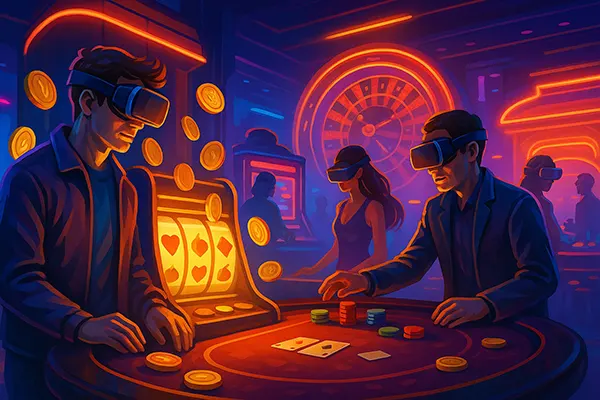Gambling in the Metaverse: How Virtual Casinos Are Transforming the Industry

The fusion of online gambling and immersive digital environments is rapidly reshaping the entertainment landscape. As metaverse platforms evolve, virtual casinos are emerging as a prominent sector that combines real-world stakes with futuristic experiences. This article explores how gambling is transitioning into virtual worlds and what this shift means for players, operators, and regulators in 2025.
The Rise of Virtual Casinos in the Metaverse
Virtual casinos within metaverse ecosystems such as Decentraland, The Sandbox, and Somnium Space are increasingly attracting both tech-savvy users and traditional gamblers. These platforms offer fully interactive casino environments where players can walk around, interact with others, and play games using digital avatars. The transition from web-based casinos to three-dimensional worlds reflects the broader trend of gamification and immersive entertainment.
One of the key factors behind the popularity of metaverse casinos is decentralisation. Most operate on blockchain technology, which ensures transparency, anonymity, and fair gameplay through smart contracts. With the integration of Web3 wallets, users can instantly connect and wager with cryptocurrencies, removing traditional banking limitations and enabling borderless participation.
By February 2025, virtual casinos have evolved beyond gimmicks. They now feature licensed games from well-known providers, real-time live dealers, and reward systems driven by non-fungible tokens (NFTs). These innovations attract a new generation of players who value digital ownership and immersive storytelling over conventional slot reels.
Player Experience and Gamification Trends
Gamification is central to the appeal of metaverse gambling. Players earn badges, NFTs, and even governance tokens that can influence platform development. These elements introduce long-term engagement mechanics that traditional casinos often lack. Moreover, many virtual casinos offer social missions, quests, and reward-based challenges, blurring the line between gaming and gambling.
Avatars play a crucial role in personalising the user journey. Through custom skins, exclusive outfits, and earned digital assets, users express individuality while navigating casino floors. This contributes to a heightened sense of immersion and emotional investment in gameplay.
Additionally, many metaverse casinos implement seasonal events or virtual festivals, mimicking real-world entertainment experiences. These events feature special games, bonus pools, and limited-time tokens, encouraging regular player returns and establishing community culture around the brand.
Security, Regulation and Player Protection in 2025
Despite the innovation, regulatory oversight has become a major focus in 2025. As more money circulates through decentralised casinos, global watchdogs are intensifying scrutiny. Governments are implementing new frameworks to classify metaverse gambling platforms and enforce consumer protections, particularly regarding underage access and money laundering risks.
Some jurisdictions now require metaverse platforms to incorporate age verification systems powered by artificial intelligence. These tools analyse avatar behaviours, voice patterns, and metadata to detect potential policy breaches. Moreover, platforms must disclose fairness protocols and provide users with access to responsible gambling tools, including self-exclusion features and wagering limits.
Licensed operators often adopt Know Your Customer (KYC) procedures even within blockchain environments. By collaborating with third-party identity services, they maintain compliance without compromising decentralisation. This balance is critical for sustaining trust in the ecosystem and ensuring legitimacy in the eyes of financial regulators.
Transparency Through Blockchain Technology
Transparency remains a defining feature of metaverse casinos. Through blockchain-based audits and provably fair systems, players can independently verify the randomness of each game. These mechanisms prevent tampering and build credibility among sceptical users.
Furthermore, smart contracts automate the payout process, removing the need for intermediaries. Once a game is completed, the reward is automatically sent to the player’s wallet, reducing transaction times and increasing trust. This automation model ensures that outcomes cannot be influenced or withheld by operators.
Audits conducted by independent blockchain analytics firms are increasingly becoming standard. These reports evaluate the smart contract code, token economics, and user activity for suspicious behaviour. Public availability of such data is essential for fostering ethical operations and deterring fraudulent practices.

Market Expansion and Future Outlook
The adoption of virtual casinos in the metaverse is not limited to individual gamers. Institutional players, such as major casino brands and entertainment companies, are now investing in virtual land and launching their own branded venues. This trend is reshaping traditional gambling business models and creating hybrid environments that blend digital and physical assets.
In addition, cross-platform interoperability is expected to grow in importance. Players will soon be able to move their avatars, digital currencies, and gaming achievements across different metaverse ecosystems. This flexibility promotes brand loyalty and user retention while enabling a more open virtual economy.
Looking ahead, the integration of artificial intelligence and mixed reality will likely further enhance the gambling experience. AI will personalise game recommendations, while AR/VR technologies will allow players to interact with 3D environments from their homes. These advancements aim to replicate the atmosphere of a luxury casino floor while maintaining the convenience of remote access.
Challenges and Ethical Considerations
As the metaverse continues to expand, ethical concerns surrounding data privacy, addiction, and financial exploitation must be addressed. Platforms must provide education on responsible gambling and transparent terms for digital ownership. Without proactive efforts, these virtual environments risk replicating or even amplifying existing issues within online gambling.
Another challenge lies in maintaining economic stability within in-game economies. Token inflation, speculative trading, and sudden regulatory changes can affect platform viability and user satisfaction. Developers need to adopt long-term governance frameworks to ensure balanced growth and stakeholder confidence.
Finally, the role of community governance is critical. By empowering users to vote on platform policies and development roadmaps, virtual casinos can build participatory ecosystems where players feel ownership and responsibility. This collaborative approach fosters resilience and innovation in an emerging digital frontier.
